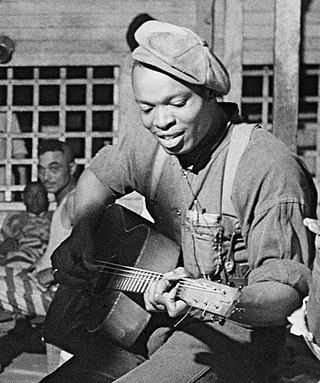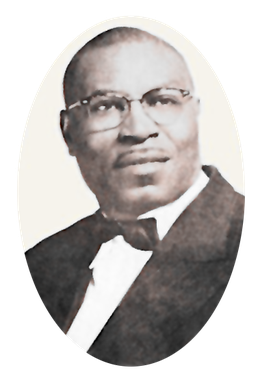
Blind Willie McTell was an American Piedmont blues and ragtime singer and guitarist. He played with a fluid, syncopated fingerstyle guitar technique, common among many exponents of Piedmont blues. Unlike his contemporaries, he came to use twelve-string guitars exclusively. McTell was also an adept slide guitarist, unusual among ragtime bluesmen. His vocal style, a smooth and often laid-back tenor, differed greatly from the harsher voices of many Delta bluesmen such as Charley Patton. McTell performed in various musical styles, including blues, ragtime, religious music, and hokum.
Piedmont blues refers primarily to a guitar style, which is characterized by a fingerpicking approach in which a regular, alternating thumb bass string rhythmic pattern supports a syncopated melody using the treble strings generally picked with the fore-finger, occasionally others. The result is comparable in sound to ragtime or stride piano styles. Blues researcher Peter B. Lowry coined the term, giving co-credit to fellow folklorist Bruce Bastin. The Piedmont style is differentiated from other styles, particularly the Mississippi Delta blues, by its ragtime-based rhythms.

Willie Lee Brown was an American blues guitar player and vocalist. He performed and recorded with other blues musicians, including Son House and Charlie Patton, and influenced Robert Johnson and Muddy Waters. Brown is considered one of the pioneering musicians of the Delta blues genre.
Roots 'N Blues: The Retrospective 1925-1950 is a four-CD box set released on Columbia Records in June 1992. The collection features about five hours of early blues, folk/country and gospel recordings from a variety of American artists. Many of these recordings had never previously been issued in any medium. The liner notes were written by Lawrence Cohn and Pete Welding.

Henry Thomas was an American country blues singer, songster and musician. Although his recording career, in the late 1920s, was brief, Thomas influenced performers including Bob Dylan, Taj Mahal, the Lovin' Spoonful, the Grateful Dead, and Canned Heat. Often billed as "Ragtime Texas", Thomas's style is an early example of what later became known as Texas blues guitar.

Ishmon Bracey, sometimes credited as Ishman Bracey, was an American Delta blues singer-guitarist. Alongside his contemporary Tommy Johnson, Bracey was a highly influential bluesman in Jackson, Mississippi, and was one of the area's earliest figures to record blues material. Bracey's recordings include "Trouble Hearted Blues" and "Left Alone Blues", both of which appear on several compilation albums.

Joshua Barnes Howell, known as Peg Leg Howell, was an American blues singer-songwriter and guitarist, who connected early country blues and the later 12-bar style. He was one of the first recorded artists of the Atlanta blues scene during the pre-war period, and he was also one of the first blues musicians to ever make a race record.
Curley James Weaver was an American blues musician, also known as Slim Gordon.

Eugene "Buddy" Moss was an American blues musician. He is one of two influential Piedmont blues guitarists to record in the period between Blind Blake's final sessions in 1932 and Blind Boy Fuller's debut in 1935. A younger contemporary of Blind Willie McTell, Curley Weaver and Barbecue Bob, Moss was part of a coterie of Atlanta bluesmen. He was among the few of his era whose careers were reinvigorated by the blues revival of the 1960s and 1970s.
Charley Lincoln, also known as Laughing Charley, was an American country blues musician. He often recorded with his brother Robert Hicks, who was billed as Barbecue Bob.

Isaac Daniel (Dan) Hornsby was an American singer-songwriter, musician, recording artist, producer and arranger, studio engineer, band leader, artists and repertoire (A&R) man with Columbia Records, and radio personality.
Eddie Mapp was an American country blues harmonicist. He is best known for his accompaniment on records by Barbecue Bob and Curley Weaver.

Ed Bell was an American Piedmont blues and country blues singer, guitarist and songwriter whose identity has only recently been verified by historians. Some of his records were released under the pseudonyms Sluefoot Joe and Barefoot Bill from Alabama. His best-remembered recording is "Mamlish Blues".
Atlanta blues refers to the local blues scene in Atlanta, Georgia, United States, which had its heyday in the 1920s and 1930s. According to AllMusic,"The Atlanta blues scene of the 1920s was among the most fertile in all the South, with a steady stream of rural musicians converging on the city hoping to gain exposure playing the local club circuit, with any luck rising to perform at Decatur Street's famed 81 Theatre."

Fred McMullen was an American blues singer and guitarist known to be active in the 1930s. He recorded with the guitarists Curley Weaver and Buddy Moss in 1933, after which there is no definitive documentation of his life or whereabouts.
George Carter was an American blues musician, who recorded four songs for Paramount Records in 1929. Very little is known of his life. Believed to have hailed from Atlanta, Georgia, United States, he played a twelve-string guitar, common in the Atlanta area, occasionally using an open tuning and a slide. Some blues scholars believe that "George Carter" may actually be a pseudonym for another Atlanta blues singer at the time, Charley Lincoln. Carter's song, "Hot Jelly Roll Blues", was recorded by Hot Tuna for their album Yellow Fever in 1975.
Cora Mae Bryant was an American blues musician. She was the daughter of another American blues musician, Curley Weaver. Bryant released two solo albums in her lifetime on the Music Maker label.
Willie Baker was an American Piedmont blues guitarist, singer and songwriter. He recorded eight tracks, playing a twelve-string guitar to back his own strong vocals. All of his recordings took place in January and March 1929 in Richmond, Indiana, United States. Details of his life outside of his recording career are sketchy.









